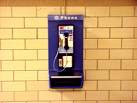Payphone Epiphany

While I consider myself young at heart a visit to Musuem London brought me to the realisation that I am a pre-digital age relic. I learned to type on a manual typerwritter. I used a Gestetner machine in high school -- not unlike the machine Museum London plans to exhibit. I remember black and white television, 45s and LPs, the Imperial system and public payphones a-plenty. I don't have and have never owned a cell phone though I do understand, in theory, the concept of texting. At most one generation separates me from most of my classmates who probably can't make those same claims. It is an indication of the rapidity of technological change in the late twentieth century not to mention the twenty-first. Technology at every turn still has the power to awe me in ways that may seem quaint or odd to those that take it for granted or were "born digital" (to steal a phrase). Living abroad for six years also means that what I experience as "new" technology is sometimes old hat to just about everybody else around me.
What has most awed me lately, however, is my inability--not for want of trying--to get a simple Bell phone connection. Suffice it to say the online "application to order new phone service" route didn't work. I fell back on old-fashioned practice and called Bell directly from a payphone. Public payphones are not so plentiful anymore but thankfully they still take coins when you can find one. Perhaps next year there will be a payphone in the Museum London vaults for future exhibition. (Note to Mike Baker probably cheaper if you acquire now.) I was connected to "Emily" the interactive, automated assistant. In a dulcet, well modulated tone Emily asked me how she could assist me. I was momentarily taken aback, speechless in fact. "I'm sorry I didn't hear your response," said Emily with no hint of impatience. What happened to the menu of options? Emily was waiting for a response. After I stammered out hesitantly, "New connection?" hoping nobody was walking past listening Emily asked me what type of connection. "Residential?" "Business?" There were more options. I didn't wait instead in a mumbled whisper I told Emily residential. Emily: "I'm sorry did you mean residential? Please say yes or no." And then, suddenly, without warning, I had an epiphany. I was talking to an algorithm.
A few weeks ago I would have had no idea what an algorithm was and if asked to guess I would have thought a musical term. But an unbidden recognition of Emily as an algorithm…it was a proud moment of reflective, albeit subconscious, practice made real. The lessons of Digital History (the class) are, seemingly, all around me. What led me to the epiphany was, I think, my mind wandering over the class discussion on folksonomies… the Steve.museum project …audience…curators engaged with and employing cutting-edge technology used by multitudes…Bell…nobody likes automated systems…everyone wants to talk to a human being…Emily a step in between, interactive more human than a machine-voice menu…an illustrative example of techies and savvy marketing folks coming together to use technology to improve business practice…WAIT: Emily is an algorithm!
The brief elation of my epiphany was replaced with a vision of a learning curve as steep and tall as the Himalayas. I’m not even in the range of the foothills and I’m not really a mountain climber. I’m struggling to simply be cognizant of and have the most basic understanding of the digital technology we discuss in class. Can I ever catch-up? Is just being aware of the technology and trying to learn and apply that technology within my pre-digital boundaries enough of a first step to having some useful tools in my novice public historian’s belt?
The only thing that saves me from despair is the comfortably familiar shape of the payphone handset I am holding; like me a pre-digital age relic. And I remember how grounded I felt at Museum London surrounded by other pre-digital age, material relics; how I experienced some of Schlereth’s theoretical observations about material culture in a visceral way (See: Thomas J. Schlereth “Material Culture and Cultural Research” in Material Culture A Research Guide: University Press of Kansas, 1985). Physical entities; three-dimensional, tangible, sensible, solid, accessible, historical--the antithesis of digital. A far more comfortable world to me than the dynamic but somewhat sterile digital world. I recognize that the coming months will bring greater perspective to both the material and digital historical worlds in very practical ways. I look at the diversity in experience and approaches to history and even life in the class and I look forward to working with my classmates in creating both a physical, material museum exhibit and a companion website. Clearly I won’t be the one bringing profound technical know-how to the table but perhaps this pre-digital relic has a few other tricks up her sleeve.
Oops, Emily is still waiting for an answer.

2 Comments:
Great post Diana. Loved the metaphors and don't worry...you are not alone! I had a dream about LINKS the other night so I figure I must be learning something. As for the payphone, I had occassion to use British Telecom this summer and let me tell you, I'd like to smack them upside the algorithm!
Kelly
Diana, I have to say I absolutely love reading your posts. You have such a gift for writing! I know, that's "what you do", but your skill really amazes (and inspires)me. I consider it a real privelege to be entertained, and provoked, by your blog. I look forward to reading on!
Post a Comment
<< Home